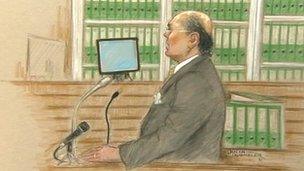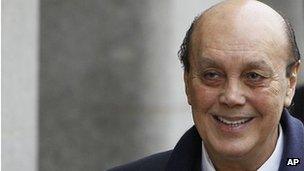Asil Nadir trial: Polly Peck tycoon fled UK 'a broken man'
- Published

Mr Nadir spoke slowly but clearly as he gave evidence at the Old Bailey
Polly Peck tycoon Asil Nadir was a "broken man" who had no hope of a fair trial when he left the UK in 1993, he has told the Old Bailey.
Mr Nadir, 71, is accused of stealing nearly £150m from his Polly Peck empire but denies all charges.
He denied he fled to northern Cyprus because he was guilty of fraud which he was being prosecuted for. He returned in August 2010 to face the charges.
Mr Nadir said the firm was put it into administration despite his protests.
'Tremendous future'
Mr Nadir denied the company, Polly Peck International (PPI), had been insolvent.
He told the court: "I think it had a tremendous future and this attitude was shared by the top brokers and investors in this country and worldwide.
"Finance was available from Turkey. The amount discussed was £70m to obtain a standstill.
"The finance was from three top Turkish banks on the instigation of the president of Turkey."
Answering questions from his lawyer, Philip Hackett QC, Mr Nadir said he began his business life as a six-year-old selling newspapers in a small town in Cyprus.
He later came to England and in 1980 acquired Polly Peck, a small textile company with a turnover of £2m a year. He turned it into a conglomerate worth £2bn.
Mr Nadir gave evidence as the defence case opened, five months after the trial started.
Mr Hackett asked Mr Nadir about an allegation which emerged in November 1992 that he had been involved in a conspiracy to bribe the original trial judge, Sir Richard Tucker.
The barrister read out a transcript of a pre-trial hearing when it was alleged Mr Nadir had conspired with Met Police Assistant Commissioner Wyn Jones and another man to bribe Judge Tucker.
Mr Nadir denied there was any such conspiracy and said he was devastated by the allegation.
He said his home was raided in April 1993 and all his legal documents were taken away.
In court, on 20 April 1993 he urged Judge Tucker to help him get the documents back. But Mr Nadir said the judge told him he was powerless to assist.
Two weeks later he flew to Turkish-occupied northern Cyprus.
'Health in tatters'
Mr Nadir told the court he was "a totally broken man" when he left the UK months before being prosecuted for fraud in 1993.
"My health was in tatters, my hope of a fair trial was in tatters, I had zero hope of receiving a fair trial," he said.

Mr Nadir denies stealing millions of pounds from his Polly Peck empire
Mr Hackett said: "The case was opened in this trial by prosecuting counsel that you left because you were guilty, in effect, and didn't want to stand trial - is that true?"
"That is not true," he replied.
Mr Nadir returned to the UK in August 2010 to face the charges.
He was asked whether he had stolen money from PPI and whether he was guilty or not guilty.
"Not guilty," he replied.
Mr Nadir's case is that the pounds he took out of the company were covered by Turkish lira from investors and his family.
He said Turkish investors benefited because they were putting money into a company rooted in the hard currencies of the UK and US.
Asked by his barrister if he disputed the movement of funds to a subsidiary company in northern Cyprus, Unipac, Mr Nadir replied: "Not at all."
He said this was to get better exchange rates to boost the company's expanding business interests abroad.
The prosecution alleges that Mr Nadir stole nearly £150m from his business empire for himself, his family and friends, through a complex series of transactions, including to a bank he owned in northern Cyprus.
The jury was told that Mr Nadir, of Mayfair, central London, had abused his position as chairman and chief executive of PPI to steal from the company.
PPI was put into administration with debts of £550m in 1990. Mr Nadir denies 13 specimen counts of theft amounting to £34m between 1987 and 1990.
- Published2 May 2012
- Published27 January 2012
- Published24 January 2012
- Published23 January 2012